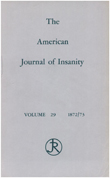Predictors of retrograde amnesia following ECT
Abstract
OBJECTIVE: Substantial progress has been made in identifying how the treatment parameters used in ECT impact on cognitive side effects. However, there is limited information regarding individual differences in vulnerability to these side effects. The authors examined patients' pretreatment global cognitive status and postictal orientation recovery time as potential predictors of the magnitude of retrograde amnesia for autobiographical memories after ECT. METHOD: Seventy-one inpatients with major depressive disorder were randomly assigned to four ECT conditions that varied in electrode placement (right unilateral versus bilateral) and stimulus dosage (low versus high intensity). Orientation recovery time was assessed at virtually every session during the course of ECT. Global cognitive status was assessed with the modified Mini- Mental State examination before treatment, during the week after termination of treatment, and 2 months after treatment ended. Retrograde amnesia was assessed at these same time points with the Autobiographical Memory Interview. RESULTS: Pre-ECT global cognitive status and the duration of postictal disorientation were strong predictors of the magnitude of retrograde amnesia in the week after the course of ECT and at 2-month follow-up. In general, these relationships were maintained regardless of technical parameters in the administration of the ECT. CONCLUSIONS: Patients who manifest global cognitive impairment before treatment and patients who experience prolonged disorientation in the acute postictal period may be the most vulnerable to persistent retrograde amnesia for autobiographical information.
Access content
To read the fulltext, please use one of the options below to sign in or purchase access.- Personal login
- Institutional Login
- Sign in via OpenAthens
- Register for access
-
Please login/register if you wish to pair your device and check access availability.
Not a subscriber?
PsychiatryOnline subscription options offer access to the DSM-5 library, books, journals, CME, and patient resources. This all-in-one virtual library provides psychiatrists and mental health professionals with key resources for diagnosis, treatment, research, and professional development.
Need more help? PsychiatryOnline Customer Service may be reached by emailing [email protected] or by calling 800-368-5777 (in the U.S.) or 703-907-7322 (outside the U.S.).



